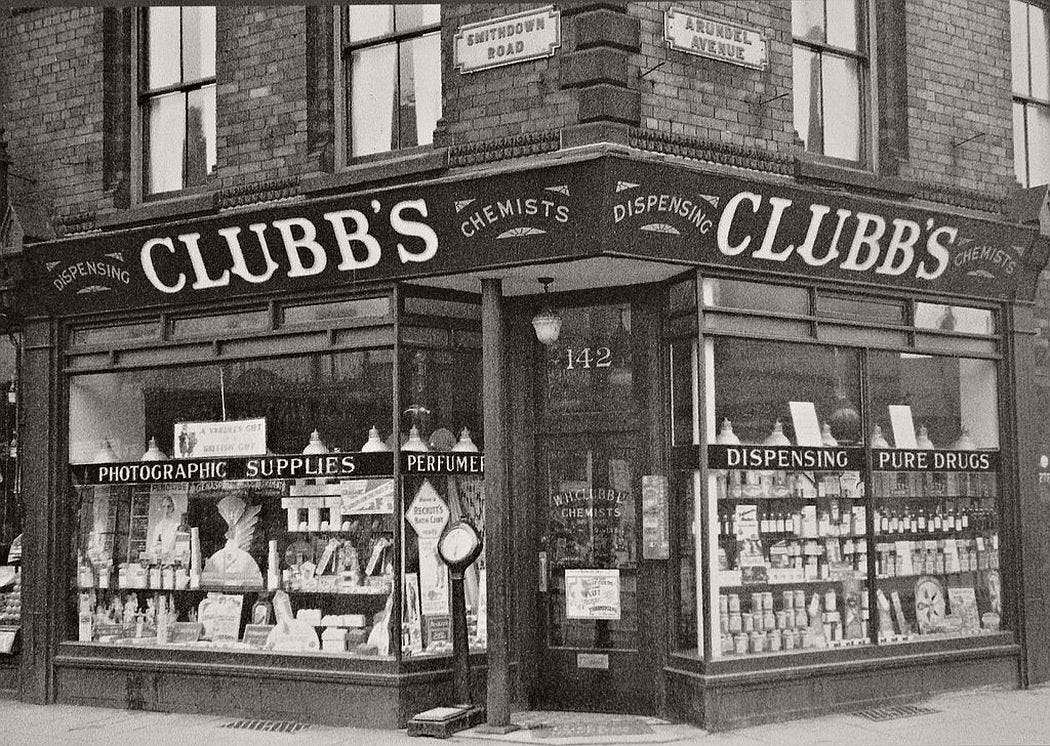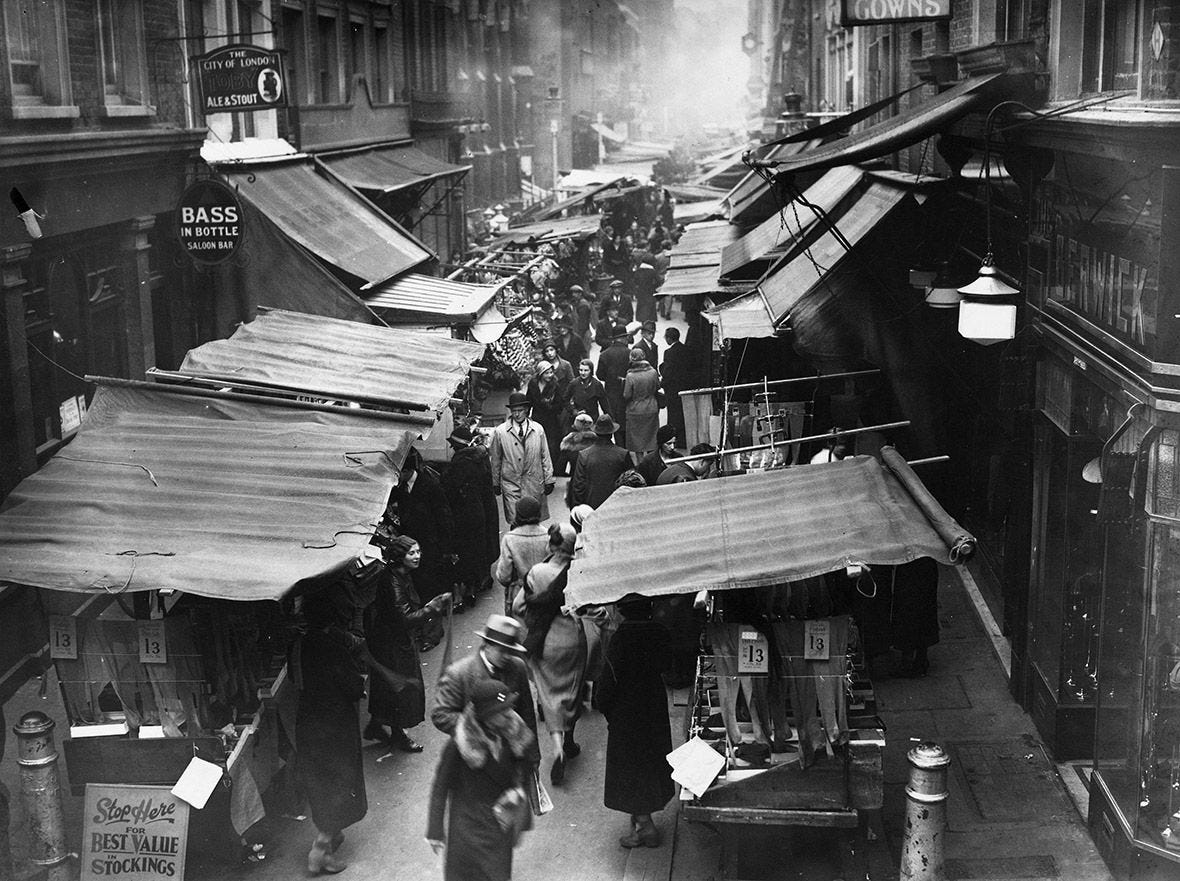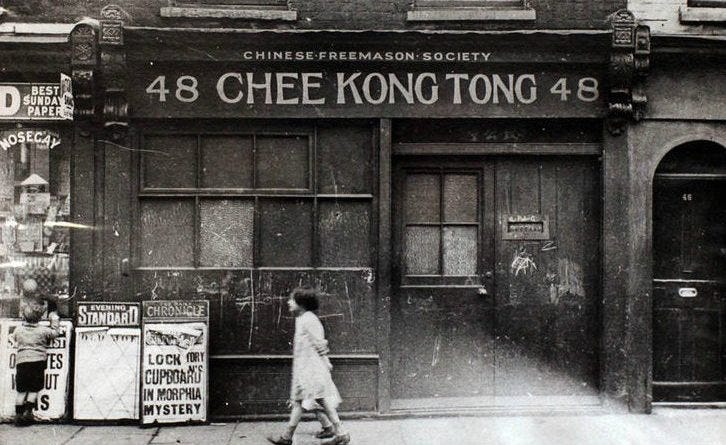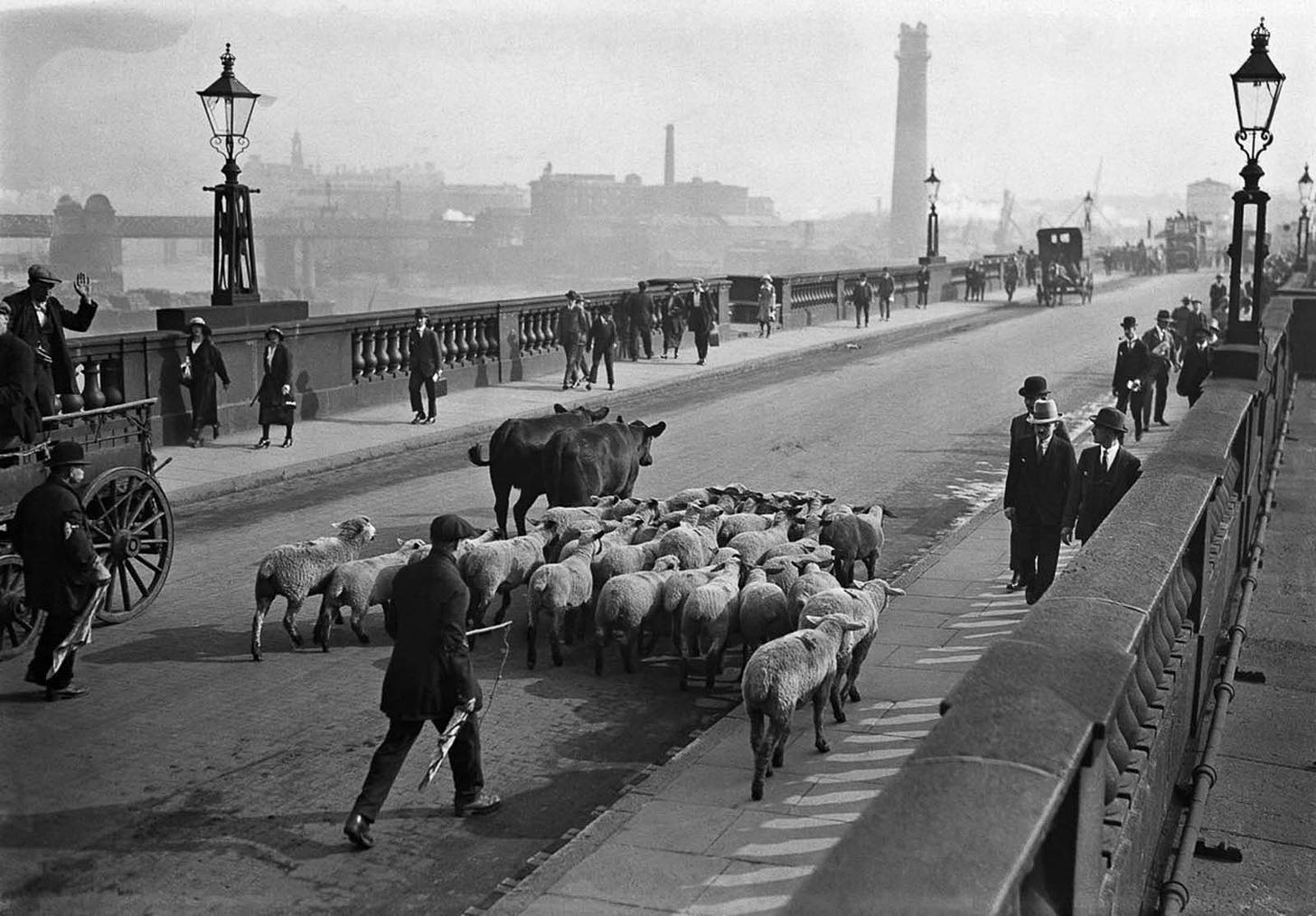An adventure for PCs based in London, possibly working for the Phantasmological Society.
A chemist’s shop in a back street of Whitechapel, not far from Spitalfields Market. Bars on all the windows. Two big padlocks on the door. Patent remedies in green glass bottles, all now smashed. Beecham’s pills, chlorodyne, ABC liniment. Lydia Pinkham’s vegetable compound. Cocaine and morphine on higher shelves.
Two days ago the owner, Martin Greene, an uneasy young man in wire-rimmed spectacles, was found dead on the floor. No way out of the building - a classic locked-room mystery. No footprints or fingerprints. Head smashed in, chest ripped open, guts torn out. If the coroner didn’t know better he’d swear the man had been gored by a bull.
A pathetic little flat above the shop. On the nightstand, the latest issue of Tomorrow - a small socialist newsletter read mostly by dockworkers in the East End. A red envelope full of black powder, marked with Chinese characters. An opium pipe. Cheap Japanese prints. A pawnbroker’s receipt for an overcoat.
A cellar. Damp brick walls. A few old books. The laboratory equipment of an enthusiastic amateur, smashed to bits. The police have already searched the room and ruled out any secret passages. You can buy a local officer a drink and he’ll mostly fill you in.
The neighbours say Martin was a quiet chap. Kept to himself. A week or so before he died, they recall a boy running up to him in the street and stealing his hat. You can find the boy. He hangs around the Black Bull Pub in Cannon Street, over by London Bridge. His name is Rigby. He wants to be a murderer when he grows up.
Around four billion years ago, the lost tenth planet Nibiru was invaded from outside the solar system by Tiamat, a cosmic predator of indeterminate form.
The Annunaki of Nibiru nominated as their war-chief Marduk, the Bull of Heaven, who slew Tiamat in single combat and proclaimed himself Universal King. But Ishtar, the king’s wife, betrayed the Annunaki by making love to the ruins of Tiamat and giving birth to the first prokaryotic life forms.
She conspired with her demonic children - your distant evolutionary ancestors - to trap Marduk in a prison dimension. All human life is an act of monstrous cuckoldry. The true king of the world is caught in a temporal labyrinth, scraping his horns on the walls, gazing balefully through peepholes at the squirming creatures who desecrate his golden realm.
We know him as the Horned King, or the Devil. One day he will find his way back in.
Captain Hugo “Buttercup” Blake first heard a version of this story in Palestine in 1917, when he was serving in the Corps of Royal Engineers, trying to take Jerusalem back from the Turks. It sounded right to him. After the war he made his way to Iraq, where he spent several productive years excavating the ruins of Babylon and learning the desert’s ancient ways.
Strong, smart, cheerful, ugly and lethally effective in every field he sets his mind to, with the brain of a nuclear scientist and the body and soul of an ape. Red hot on the Bolsheviks and not too fond of Jews. Blake returned to London a few months ago, persuaded that a Communist conspiracy was out to rule the world and determined to defend his country against the foreign menace.
He has a secret weapon.
The King’s First Regiment meets every Friday night in the secret mithraeum underneath the Black Bull Pub, accessible through the cellars. There’s a statue of Moloch, brought in by the Templars when they converted the place to a demon chapel in the Middle Ages. The pub sign, a cheerful man slaughtering a bull, is instantly recognisable as a tauroctony to any scholar of the classics.
The Regiment is a secret gang, a freikorps, mostly composed of Blake’s old army buddies. (And his girlfriend, Myra, a kohl-eyed violence-loving vamp.) They go around in black masks with brass knuckles, beating the shit out of union men and printer’s clerks.
They include Jim “Pouter” Barlowe, Blake’s old batman and a dedicated pigeon fancier, who’s never been quite the same since the Turks caught him alone in the desert one moonless night, and a pair of thumb-headed drill sergeants from Essex with webbed feet named Munson and Tyrone.
There’s Doyle, a jittery opium addict from Belfast who believes in leprechauns and lost an ear at Gallipoli, and a bald Channel Islander named Grenville who won’t stop smoking cigars and claims to have sucked the toes of the Angel of Mons. I could go on.
Last month a Polish anarchist was found hogtied on the Embankment, face painted black and most of his fingers broken, balls a mass of mush from having been kicked so many times.
A few days later an old clay tablet, supposedly retrieved by Hormuzd Rassam from the Library of Ashurbanipal, was stolen from the British Museum. The curators say they always thought it was a fake. But they won’t meet your eye.
Asterion, the Minotaur of London, a projection of the tiniest part of Marduk’s power, was summoned and bound by Templars in the Middle Ages. The tablet describes his nature, and how he may be constrained.
Asterion fears the sight of Heaven. He needs a roof over his head. He can’t go anywhere the sky can see him, on pain of instant banishment and death. The maze of cellars, sewer tunnels, mediaeval catacombs, forgotten rivers and train lines that runs under all of modern London is his only home.
Whenever he wants to go somewhere, a path is always there. History bends around him. The tunnel is always wide enough to just barely accommodate his horns. It becomes already true that someone made it that way, long ago. Look it up in the parish records. You’ll find records of the diggings there.
Once he passes, the tunnel fades away. History goes back to what it was. This takes about an hour.
Martin Greene was a test. Blake paid Rigby to steal his hat, then burnt it as an offering to Moloch. The smoke wafted down through a hidden pipe into the underworld. Asterion got the scent. He came up through the cellar, where there had always been a secret passage to the drains, until there wasn’t again.
Blake can send Asterion after anyone, as long as he can get the Regiment to steal one of their personal items first. Anything they’ve owned a long time will have their psychic scent. And as long as they’re somewhere in London, indoors. He will keep going until Communism has been totally destroyed and England devoted to worship of the Horned King. In his heart he is Prime Minister and Queen Elizabeth his bride.
He picks his targets by reading the news and talking to his friends on the police force. They are, in roughly this order -
Quan Chen. Runs a Limehouse opium den, hidden beneath a warehouse full of Oriental goods. Sold Martin Greene black lotus powder. Short, quiet, fond of philosophy and mah-jong. Quite liked Greene and sad to learn he’s dead.
Alf McManus. Editor and more or less the sole employee of Tomorrow. Spectacles, beard. Has Greene’s name on his short subscriber’s list. Written several articles about the Regiment’s activities, accusing the police of being on their side. Uses black lotus powder to dream about the shining socialist cities of the future. Printing press in his basement will be smashed.
Frankie “the Finger” Cohen. Runs a pawn shop in Shadwell, near Cable Street. Known to the police as a receiver of stolen goods. Honestly not sure why he has that name, as nobody will tell him. Lets Alf use his rooms for meetings sometimes.
Florence Wong. Runs a free clinic for sailor’s orphans and old Chinese widows with nowhere to go. Dedicated social reformer and perfect angel. Stopped going to Alf’s meetings as she thought he wasn’t serious enough. Keeping an eye on the lotus trade.
Reverend Peter Dinsdale. Sacrist at St. Paul’s Cathedral. Chastely in love with Florence Wong and has preached several sermons inspired by her example. Interested in the Templars. Liable to be found dead in the crypts below the cathedral, which go deeper than you might think.
Nikolai Karkarov. Bolshevik spy and agitator, disguised as a tobacco salesman. Using Cohen’s shop as a dead drop. Funding Tomorrow, though he’s not sure why, as Alf’s understanding of dialectical materialism is poor at best. Lives on the second floor of a Wapping flophouse - might get away by jumping out the window. The landlady will be unharmed.
Inspector Henry Maidenstone. Extremely right wing but not in fact on the side of the Regiment because you can’t just go around killing people. Having trouble getting some of his officers to see that though. Chen secretly works for him. Blake is thoroughly convinced he is a Communist.
Clement Attlee. MP for Limehouse. Has ambitions. Possibly in touch through Karkarov with Lunacharsky and the biocosmists, who are using Tibetan sex magic to build the New Soviet Man. Ideal endgame is saving him from an attack in the Houses of Parliament by getting the minotaur to chase you up Big Ben.
The Regiment is based on Bulldog Drummond’s Black Gang. Did you know they could write books in the 20s where the cool action hero beat up Jews? In this bold new era of internet racism, allow me to state that I’m still against it. Check out Thomas Burke’s Limehouse Nights for more setting flavour, and also a lot of Fu Manchu.
Is this enough to run a game with? It’s really up to the DM to keep Asterion active. Add your own victims, get him into the Tower of London if you can. I would say he’s immune to bullets but it should be possible to lure him out under the sky, and if you can steal the tablet back from Blake it might contain a spell to put him down. The players should learn that if somebody loses a precious item to the Regiment, they’re likely to be Asterion’s next victim. And even if they stop the beast the soldiers are a real threat as well.
Of course you could take Blake’s side. There’s no rule in the game that says you’re not allowed to join a cult. But if you start a full-blown magic war with the Communists you’ll soon find that the Horned King is not the only power in the world.








All I can say, is "Wow." Your sense of the pulp ethos is uncanny. This would be a treasure trove for a GM -- lots of ways to create trouble for players. And the historical flavor cannot be beaten.